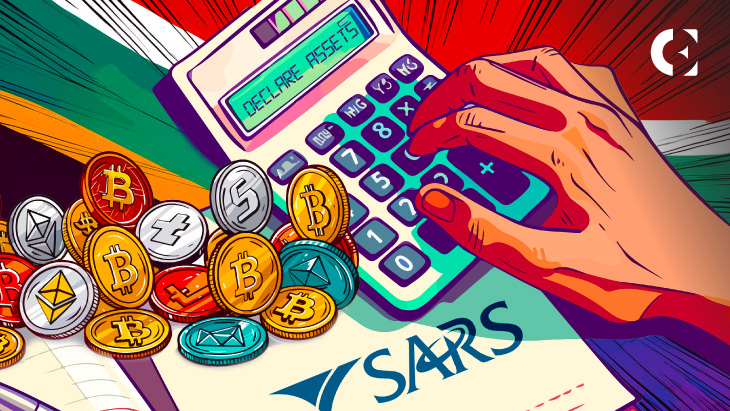- SARS increases crypto oversight, requiring traders to report digital assets on their tax returns.
- Partnership with FSCA aims to enhance compliance and gather data from crypto exchanges.
- South Africa to license 60 crypto firms by October; applications due by November 30.
The South African Revenue Service (SARS) is increasing its scrutiny of crypto asset holders and traders, warning that individuals must report their digital assets on their tax returns. With an estimated 5.8 million South Africans actively trading crypto, SARS is taking steps to increase regulation in this growing sector.
SARS has teamed up with the Financial Sector Conduct Authority (FSCA) to gather information from local crypto exchanges. This partnership aims to streamline data collection on digital asset holdings, focusing on traders who haven’t yet declared their assets.
Licensed exchanges like Luno and VALR have confirmed that they will cooperate with legal requests from SARS for specific investigations, though they don’t automatically share client data.
The Impact of Tax Evasion on Society
SARS Commissioner Edward Kieswetter highlighted the agency’s commitment to tax audits, warning that tax evasion creates an unfair burden on honest taxpayers.
Read also: South Africa’s Crypto Industry Grows as 63 Firms Receive Licenses
He explained that people who don’t pay their taxes make it harder for others to comply. This also affects vulnerable groups in society, as it limits the government’s ability to fund social programs.
Kieswetter added that SARS is actively sharing information with other tax authorities globally through joint agreements, facilitating the cross-border exchange of information about South African taxpayers and their digital assets.
Licensing of Cryptocurrency Platforms
South Africa is also preparing to license around 60 crypto firms by the end of October. The FSCA set a deadline of November 30 for exchanges to submit their licensing applications. Commissioner Unathi Kamlana confirmed that they are processing these applications in phases.
Read also: South Africa Will Grant Licenses to 60 Crypto Platforms by the End of the Month
Kamlana noted that companies whose license applications are denied can reapply under current legislation. This move shows South Africa’s commitment to building a strong regulatory framework for crypto asset trading, following Botswana, which was the first African nation to issue a cryptocurrency license in 2022.
Disclaimer: The information presented in this article is for informational and educational purposes only. The article does not constitute financial advice or advice of any kind. Coin Edition is not responsible for any losses incurred as a result of the utilization of content, products, or services mentioned. Readers are advised to exercise caution before taking any action related to the company.







